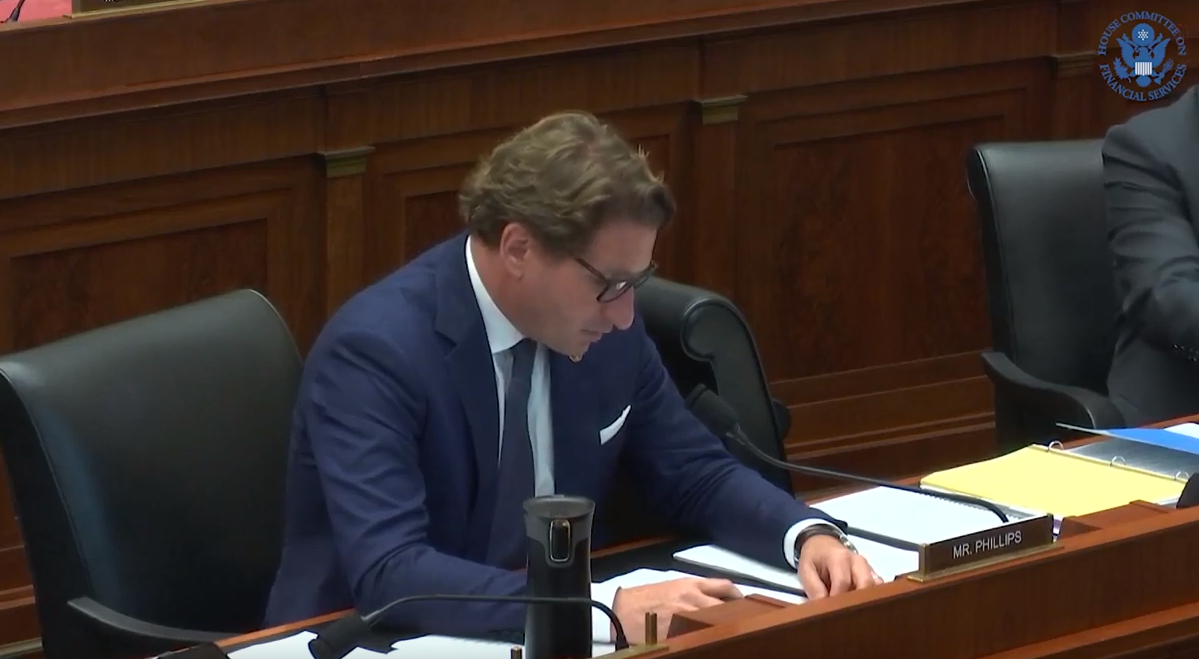Press Releases
Phillips Bill To Increase Oversight Of Banking Regulators Passes Unanimously Out Of Committee
Washington, DC,
November 5, 2019
– Last week, the House Financial Services Committee unanimously passed The Prudential Regulator Oversight Act (H.R. 4841), authored by Rep. Dean Phillips (MN-03), in a 55-0 vote. The bipartisan legislation requires federal prudential banking regulators to provide annual testimony to the House Financial Services Committee, along with semiannual reports on their supervisory and regulatory activities. Representatives Anthony Gonzalez (R, OH), Joyce Beatty (D, OH), and Barry Loudermilk (R, GA) are original co-sponsors. Prudential regulators - the Federal Reserve, the Federal Deposit Insurance Corporation (FDIC), the Office of the Comptroller of the Currency, and the National Credit Union Administration - are designed to promote bank solvency and avoid bank failures, and thus protect taxpayers and the stability of the financial system.
Click here to watch Rep. Phillips introduce The Prudential Regulator Oversight Act Below are Rep. Phillips’s remarks as prepared: Today, we will consider my legislation—the Prudential Regulators Oversight Act—to require senior officials at the Federal Reserve, the FDIC, the Office of the Comptroller of the Currency, and the National Credit Union Administration to semi-annually report to and annually testify before the House and Senate on their supervisory and regulatory activities. When Dodd Frank was passed in 2010, it created the position of the Vice Chairman for Supervision for the Federal Reserve and required the Vice Chairman to testify before this committee at regular intervals regarding the efforts, activities and plans of the Board with respect to their supervisory conduct. Today, there is no such requirement for mandatory testimony for regulators at the OCC, FDIC, and NCUA even though virtually all depository institutions are federally insured and thus subject to at least one federal primary regulator. In fact, prior to the May hearing with prudential regulators earlier this year, it had been more than three years since any official from the FDIC or NCUA had testified before the House. These agencies are responsible for monitoring the safety and soundness of our financial system, as well as compliance with federal banking laws approved by this Committee. They play a large role in protecting taxpayers by promoting bank solvency and intercepting and preventing bank failures. Congress’s oversight authority is derived from its implied powers in the Constitution, making it an integral part of the American system of checks and balances. Our Committee—indeed Congress as an institution—could not responsibly or reasonably exercise our legislative powers without knowing what the Executive Branch was doing, how programs were being administered, and whether officials were obeying and complying with the law with Congress’s intent in mind. The Prudential Regulators Oversight Act will provide our committee a further opportunity to examine the activities of the regulators and to determine for ourselves whether they are exercising their powers appropriately. So, I urge my colleagues to join me today in increasing transparency, which is necessary for good governance, and solidifying Congress’s role in achieving financial stability throughout the country. Lastly, I want to thank Mr. Loudermilk for his leadership on this bill and our colleagues from Ohio, Mr. Gonzalez and Ms. Beatty for their support as original cosponsors to this important legislation. ### |


